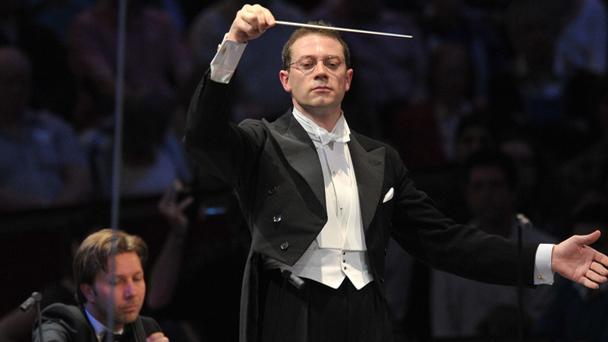Holst? Yes. Britten? Maybe. But John Adams? Programming Adams’ Guide to Strange Places as the extended opener in this National Youth Orchestra of Great Britain concert made complete sense after a few minutes; conductor John Wilson’s strengths as an interpreter of Hollywood film scores and British light music made him ideally suited to unpick the thornier metrical complexities of the Adams work. Wilson’s beat is disarmingly precise, every gear change spelt out with refreshing precision. Which, when he’s dealing with 165 musicians who look as fresh-faced as he does, can only be a good thing.
Guide to Strange Places dates from 2001, Adams having taken inspiration from a guidebook found in Provence. Twenty-five minutes of dizzying travelogue ultimately come to seem too much of a good thing. The scoring, particularly for brass and percussion, is dazzling, and the sheer fecundity of Adams’s invention always amazes. There are passages where we shift abruptly from intense sunlight to neon-lit film noir. Gamelan-like tuned percussion riffs tickle the ear. All played here with terrifying panache, most notably by an extravagant rhythm section. Low brass pumped out menacing bass lines. But you were left wishing that the piece was five-10 minutes shorter. Adams’s oblique, downbeat ending suits the work’s edgy mood perfectly, but left you feeling relieved rather than wanting more. This composer’s vast Harmonielehre and joyous The Chairman Dances sustain their spans with far more conviction.
How often do we get to hear this peculiar, eclectic suite played this well and with this much affection?
Britten’s Four Sea Interludes do in places sound like high-class film music, and hearing them performed by an orchestra nearly three times the size of the average opera pit band was startling. The ominous brass chords that punctuate Dawn spoke with brutal, immaculately tuned weight. Wilson’s predilection for juicy string vibrato lent Britten’s aching violin lines delicious colour, and hearing the NYO’s massed strings holding their own against the brassy church bells of Sunday Morning was stunning. And, as you’d expect, Britten’s bleak Storm moved with devastating ferocity. Significantly, the little details registered most tellingly, notably a gloriously played tambourine heard before the return of the blustery storm music.
Playing Holst’s The Planets was a more predictable choice, given the extravagant resources at this ensemble’s disposal. But how often do we get to hear this peculiar, eclectic suite played this well and with this much affection? Without getting too metaphysical and misty-eyed, these musicians play as if they really mean it – every detail lovingly drawn, and the crowd-pleasing moments projected with transcendent force. Wilson’s swift, punchy Mars gave way to a seductive, Ravelian Venus full of allure. Wisely, Mercury wasn’t rushed, allowing the NYO's exemplary wind principals to shine. Jupiter’s big tune was sonorous without sounding indulgent. Best of all were the three closing movements; Uranus’s jaunty band music beautifully, wittily pointed, and Neptune’s choral fade (sung, in tune, by the ladies of the Leeds Festival Chorus) accomplished neatly with a slowly closing door.
Before both movements we heard Saturn’s deathly processional. It was directed with chilling sobriety by Wilson, despite these players being far too young to be worrying about such things. The Planets can too easily sound like a sequence of vacuous, colourful highlights. Here, the music’s progression from aggressive exuberance to otherworldly abstraction was beautifully plotted, and the extended, rapt silence as Neptune ebbed away was exquisite; the entire vast audience collectively holding its breath. The same team repeat this programme at the Barbican this afternoon. Fight for a ticket.













Add comment